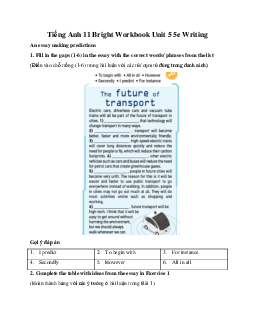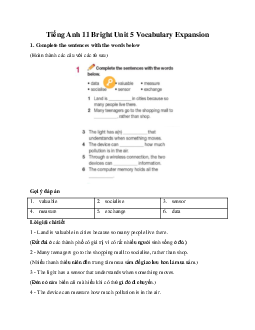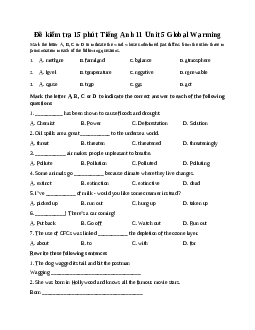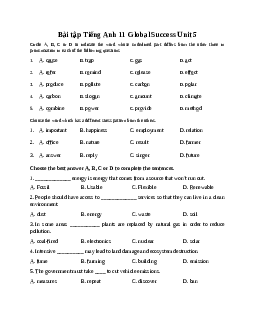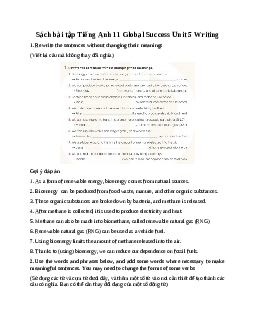




Preview text:
Tiếng Anh 11 Global Success Unit 5 Language Pronunciation
Sentence stress and rhythm
1. Listen and repeat. Pay attention to the sentence stress and rhythm.
(Lắng nghe và lặp lại. Hãy chú ý đến trọng âm và nhịp điệu của câu)
1. The planet is getting hotter and hotter.
2. We talked about the causes of floods.
3. Burning coal is bad for our health.
4. Why is farming a big source of greenhouse gases?
2. Underline the stressed words in the sentences. Listen and check. Then practise
saying the sentences with a natural rhythm.
(Gạch dưới các từ được nhấn mạnh trong các câu. Nghe và kiểm tra. Sau đó tập nói các
câu với nhịp điệu tự nhiên) Gợi ý đáp án
1. The village was completely destroyed by floods.
2. Some gases are released into the air through human activities.
3. Has the earth’s temperature increased in the past few years?
4. Some environmental disasters will become more frequent. Vocabulary Global warming
1. Match the words with their meanings.
(Nối các từ với nghĩa của chúng) Gợi ý đáp án 1. e 2. c 3. d 4. a 5. b Lời giải chi tiết
1 - e. coal (n) - a black rock that is found under the ground and is burnt to produce heat
(than (n) - một loại đá đen được tìm thấy dưới lòng đất và bị đốt cháy để tạo ra nhiệt.)
2 - c. fossil fuel (n) - a substance that was formed millions of years ago from dead animals or plants.
(nhiên liệu hóa thạch (n) một chất được hình thành từ hàng triệu năm trước từ động vật
hoặc thực vật đã chết)
3 - d. release (v) - to let a substance flow out
(giải phóng (v) - để cho một chất chảy ra)
4 - a. renewable (adj) - that can be replaced naturally without being used up
(có thể tái tạo (adj) có thể thay thế một cách tự nhiên mà không bị sử dụng hết)
5 - b. waste (n) - materials that are not needed and are thrown away
(chất thải (n) - vật liệu không cần thiết và bị vứt đi)
2. Complete the sentences using the correct forms of the words in 1.
(Hoàn thành các câu sử dụng dạng đúng của từ trong 1) Gợi ý đáp án 1. renewable 2. waste 3. released 4. coal 5. fossil fuels Grammar
1. Find and correct the mistakes in the following sentences.
(Tìm và sửa lỗi sai trong các câu sau) Gợi ý đáp án
1. Was waiting for the train, I read some articles about global warming.
--> While waiting for the train, I read some articles about global warming.
2. Saw the forest fire, the children immediately called the police.
--> When they saw the forest fire, the children immediately called the police.
3. The students took part in green activities, were planting more than 100 trees.
--> The students took part in green activities and planted more than 100 trees.
2. Rewrite these sentences using past participle clauses.
(Viết lại những câu này sử dụng mệnh đề quá khứ phân từ) Gợi ý đáp án
1. If farm animals are not kept cool in hot weather, they can suffer from heat stress.
--> Not kept cool in hot weather, farm animals can suffer from heat stress.
2. Some farmers were worried about the consequences of deforestation, so they stopped
burning trees to create farmland.
--> Worried about the consequences of deforestation, some farmers stopped burning trees to create farmland.
3. If carbon dioxide is produced in huge amounts, it causes air pollution and climate change.
--> Produced in huge amounts, carbon dioxide causes air pollution and climate change
3. Work in pairs. Make sentences, using present participle and past participle clauses.
(Đặt câu, sử dụng mệnh đề phân từ hiện tại và quá khứ phân từ) Gợi ý đáp án
1. Using public transportation instead of driving, we are reducing our carbon footprint.
Realizing the negative impact of excessive driving, we have started using public transportation.
2. Recycling paper and plastic, we are contributing to the reduction of waste.
Encouraged to recycle more by our local council, we started recycling paper and plastic.
3. Cleaning up litter from the streets, we are improving the local environment.
Appalled by the amount of litter we saw on the streets, we started cleaning up the litter.
